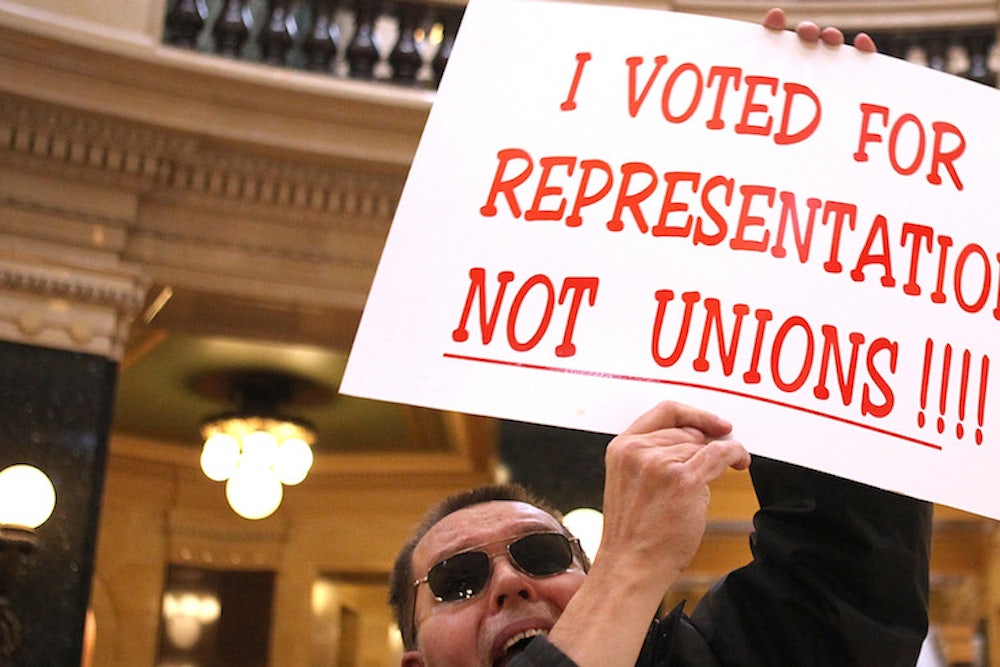The big Supreme Court ruling that everybody is watching for on Monday is Hobby Lobby, the lawsuit challenging Obamacare’s contraception mandate. But there’s one other, very important decision expected on the Court’s last day of the session. The case is Harris v. Quinn and it could have a damaging and long-lasting effect on public sector unions—and, potentially, the labor movement as a whole.
The plaintiff in the case is Pamela Harris, of Illinois, who provides in-home care for her 25-year-old son with disabilities and receives compensation for it from the state’s Medicaid program. This is a common arrangement, designed to make it possible to assist family members who care for relatives with serious illnesses. But in Illinois, as in a few other states, there’s a twist.
In 2003, the governor declared all home health care workers to be public employees. The theory behind the decision was that the workers are getting much of their money from the government, in the form of Medicaid. The widely understood idea was to make it easier for them to organize into a union, since government doesn’t fight organizing drives the way private companies do. The state’s employees eventually voted to do just that, joining the Service Employees International Union. As a result, Harris must pay a portion of SEIU’s membership dues—an administrative fee, in order to support the bargaining the SEIU does on behalf of employees—even if she opts not to join the organization formally. She’s not happy about that, so she filed a lawsuit. Forcing her to pay union dues, she says, violates her constitutional rights.
The question of whether it’s okay to force people to pay union dues is a long-standing controversy. Defenders of unionism, not least among them the unions themselves, argue that it’s necessary to prevent “free-riding.” When a union negotiates on behalf of its members, all workers benefit from the higher wages, better job protections, and so on. As the theory goes, all workers should have to share in the administrative costs of this work. (There’s a separate controversy over whether it’s fair to require all workers to support union political activity.)
Opponents of unionism, like the National “Right to Work” Committee (NRTWC) Legal Defense Foundation, believe such arrangements amount to coercion. The organization and its allies have persuaded 24 states to create laws allowing workers to opt out of private sector union membership and dues, and those laws are widely thought to be a big reason unions have been so weak across the South. The organization has also targeted public unions and has provided the legal counsel for Harris’ suit.
The Supreme Court has weighed in on this controversy before. In 1977, nonunion public school teachers sought to overturn the union fee requirement on the grounds that it violated their First Amendment rights. In that case, Abood v. Detroit Board of Education, the Court sided with unions, upholding the fair share fee requirement. But since the Court granted certiorari in the Harris case, people have speculated it may choose to limit or overturn Abood.
During Harris’s oral arguments, Justices Alito, Kennedy, Roberts, and Thomas appeared ready to rule in favor of the plaintiffs, while Justices Breyer, Ginsburg, Kagan, and Sotomayer seemed prepared to support Illinois Gov. Pat Quinn. That has many observers assuming the decision will come down to Scalia. In 1991, Scalia rejected the NRTWC’s argument in his concurrence of Lehnert v. Ferris Faculty Association. Organized labor is hoping he sticks to his guns. But in a 2012 decision, Knox v. Service Employees (2012), Scalia joined the majority opinion, written by Alito, that limited union power.
If the justices decide to rule for Harris and against SEIU, they could do so in a couple of ways. On the one hand, they could issue a relatively narrow opinion. Home health care workers are in somewhat unusual position, in part because the union bargains on their behalf by seeking greater reimbursements from Medicaid. The justices could decide that’s basically political activity, rather than more traditional collective bargaining activity, and invalidate the fees based on that basis. That would affect home health care workers and, perhaps, other workers whose incomes depend on direct payment from government programs. (Think childcare.) It might not apply to other public sector employees.
But the justices could also issue a broader ruling. They could decide it’s wrong to make any public employees pay the administrative fees for collective bargaining. That would essentially turn all public-sector workers into “right to work” occupations. There’s even a chance—albeit very remote, according to experts—that the justices could extend their ruling to the private sector, arguing that exclusive representation by unions inherently limits constitutional rights to free speech and association.
The stakes for the unions here are pretty big. In Illinois, SEIU currently receives about $3.6 million a year from the state’s home-care workers. Without mandatory fees from all these workers, it would lose income from nonunion employees. But SEIU would still have an obligation to represent all employees, who would now have the option of that representation for free. “If the case goes in favor of the petitioner, then it’s going to starve the union of the money it needs to represent the workers,” says Alex Colvin, a professor of conflict resolution at Cornell’s School of Industrial Labor Relations.
Still, notes Harvard Law Professor Benjamin Sachs, unions have adjusted to difficult court decisions in the past. Some unions, such as AFSCME, have already begun increasing the number of workers signed up as full union members in anticipation of a Harris decision, Sachs said. “It’s not easy, but not impossible,” he said.
